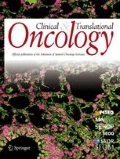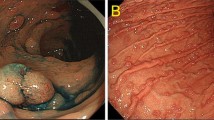Abstract
Gastric cancer is the major cause of cancer-related deaths worldwide. The majority of them are classified as sporadic, whereas the remaining 10% exhibit familial clustering. Hereditary diffuse gastric cancer (HDGC) syndrome is the most important condition that leads to hereditary gastric cancer. However, other hereditary cancer syndromes, such as hereditary non-polyposis colorectal cancer, familial adenomatous polyposis, Peutz-Jeghers syndrome, Li-Fraumeni syndrome and hereditary breast and ovarian cancer, entail a higher risk compared to the general population for developing this kind of neoplasia. In this review, we describe briefly the most important aspects related to clinical features, molecular biology and strategies for prevention in hereditary gastric associated to different cancer syndromes.
Similar content being viewed by others
References
Fitzgerald R, Hardwick D, Huntsman D et al (2010) Behalf of the International Gastric Cancer Linkage Consortium. Hereditary diffuse gastric cancer: updated consensus guidelines for clinical management and directions for future research J Med Genet 47:436
Guilford P, Bostjan H, Blair V (2010) Hereditary diffuse gastric cancer: translation of CDH1 germline mutations into clinical practice. Gastric Cancer 13:1–10
Hebbard PC, MacMillan A, Huntsman D et al (2009) Prophylactic total gastrectomy (PTG) for hereditary diffuse gastric cancer (HDGC): the Newfoundland Experience with 23 Patients. Ann Surg Oncol 16:1890–1895
Guilford P, Hopkins J, Harraway J et al (1998) E-cadherin germline mutations in familial gastric cancer. Nature 392:402–405
Oliveira C, Sousa S, Pinheiro H et al (2009) Quantification of epigenetic and genetic 2nd hits in CDH1 during hereditary diffuse gastric cancer syndrome progression. Gastroenterology 136:2137
Guilford P, Humar B, Blair V (2010) Hereditary diffuse gastric cancer: translation of CDH1 germline mutations into clinical practice. Gastric Cancer 13:1–10
Carneiro F, Huntsman DG, Smyrk TC et al (2004) Model of the early development of diffuse gastric cancer in E-cadherin mutation carriers and its implications for patient screening. J Pathol 203:681–687
Barber ME, Save V, Carneiro F et al (2008) Histopathological and molecular analysis of gastrectomy specimens from hereditary diffuse gastric cancer patients has implications for endoscopic surveillance of individuals at risk. J Pathol 216:286–294
Charlton A, Blair V, Shaw D et al (2004) Hereditary diffuse gastric cancer: predominance of multiple foci of signet ring cell carcinoma in distal stomach and transitional zone. Gut 53: 814–820
Barber ME, Save V, Carneiro F et al (2008) Histopathological and molecular analysis of gastrectomy specimens from hereditary diffuse gastric cancer patients has implications for endoscopic surveillance of individuals at risk. J Pathol 216:12–18
Charlton A, Blair V, Shaw D et al (2004) Hereditary diffuse gastric cancer: predominance of multiple foci of signet ring cell carcinoma in distal stomach and transitional zone. Gut 53:814
Norton JA, Ham CM, Dam JV et al (2007) CDH1 truncating mutations in the E-cadherin gene: an indication for total gastrectomy to treat hereditary diffuse gastric cancer. Ann Surg 245:873–879
Robin M. Cisco, James M et al (2008) Hereditary diffuse gastric cancer implications of genetic testing for screening and prophylactic surgery. Cancer 1:7
Ano T, Kobori O, Muto T (1992) Lymph node metastasis from early gastric cancer: endoscopic resection of tumour. Br J Surg 79:241–244
Lewis FR, Mellinger JD, Hayashi A et al (2001) Prophylactic total gastrectomy for familial gastric cancer. Surgery 130:612–617
Chun YS, Lindor NM, Smyrk TC et al (2001) Germline E-cadherin gene mutations: is prophylactic total gastrectomy indicated? Cancer 92:181–187
Petersen GM, Slack J, Nakamura Y (1991) Screening guidelines and premorbid diagnosis of familial adenomatous polyposis using linkage. Gastroenterology 100:1658–1664
Lanch KL, Buerke CA, Bennett AE et al (2008) Fundic gland polyp dysplasia is common in familial adenomatous polyposis. Clin Gastroenterol Heptatol 6:180–185
Spigelman AD, Williams CB, Talbot IC et al (1989) Upper gastrointestinal cancer in patients with familial adenomatous polyposis. Lancet 2:783–785
Petersen GM, Slack J, Nakamura Y (1991) Screening guidelines and pre-morbid diagnosis of familial adenomatous polyposis using linkage. Gastroenterology 100:1658–1664
Half E, Bercovich D, Rozen P (2009) Familial adenomatous polyposis. Orphanet J Rare Dis 4:22
Abraham SC, Nobukawa B, Giardiello FM et al (2000) Fundic gland polyps in familial adenomatous polyposis: neoplasms with frequent somatic adenomatous polyposis coli gene alterations. Am J Pathol 157:747–754
Toyooka M, Konishi M, Kikuchi-Yanoshita R et al (1995) Somatic mutations of the adenomatous polyposis coli gene in gastroduodenal tumors from patients with familial adenomatous polyposis. Cancer Res 55:3165–3170
Gallagher MC, Phillips RK, Bulow S et al (2006) Surveillance and management of upper gastrointestinal disease in familial adenomatous polyposis. Familial Cancer 5:263–273
Debinski HS, Spigelman AD, Hatfield A et al (1995) Upper intestinal surveillance in familial adenomatous polyposis. Eur J Cancer 31:1149–1153
Church JM, McGannon E, Hull-Boiner S et al (1992) Gastroduodenal polyps in patients with familial adenomatous polyposis. Dis Colon Rectum 35:1170–1173
Offerhaus GJ, Giardiello FM, Krush AJ et al (1992) The risk of upper gastrointestinal cancer in familial adenomatous polyposis. Gastroenterology 102:1980–1982
Domizio P, Talbot IC, Spigelman AD et al (1990) Upper gastrointestinal pathology in familial adenomatous polyposis: results from a prospective study of 102 patients. J Clin Pathol 43:738–743
Debinski HS, Spigelman AD, Hatfield A et al (1995) Upper intestinal surveillance in familial adenomatous polyposis. Eur J Cancer 31A:1149–1153
Zwick A, Munir M, Ryan CK et al (1997) Gastric adenocarcinoma and dysplasia in fundic gland polyps of a patient with attenuated adenomatous polyposis coli. Gastroenterology 113:659–663
Bulow S, Bjork J, Christensen IJ et al (2004) Duodenal adenomatosis in familial adenomatous polyposis. Gut 53:381–386
Spigelman AD, Williams CB, Talbot IC et al (1989) Upper gastrointestinal cancer in patients with familial adenomatous polyposis. Lancet 2:783–785
Bülow S, Björk J, Christensen IJ et al (2004) DAF Study Group: duodenal adenomatosis in familial adenomatous polyposis. Gut 53:381–386
Steinbach G, Lynch PM, Phillips RK et al (2000) The effect of celecoxib, a cyclooxygenase-2 inhibitor, in familial adenomatous polyposis. N Engl J Med 342:1946–1952
Giardiello FM, Hylind LM, Trimbath JD et al (2005) Oral contraceptives and polyp regression in familial adenomatous polyposis. Gastroenterology 128:1077–1080
Müller MW, Dahmen R, Köninger J et al (2008)) Is there an advantage in performing a pancreaspreserving total duodenectomy in duodenal adenomatosis? Am J Surg 195:741–748
Cai SJ, Xu Y, Cai GX et al (2003) Clinical characteristics and diagnosis of patients with hereditary nonpolyposis colorectal cancer. World J Gastroenterol 9:284–287
Lynch HT, Lynch PM, Lanspa SJ et al (2009) Review of the Lynch syndrome: history, molecular genetics, screening, differential diagnosis, and medicolegal ramifications. Clin Genet 76:1–18
Caldas C, Carneiro F, Lynch HT et al (1999) Familial gastric cancer: overview and guidelines for management. Med Genet 36:873–880
Bonis PA, Trikalinos TA, Chung M et al (2007) Clinical characteristics and diagnosis of patients with hereditary nonpolyposis colorectal cancer. Evid Rep Technol Assess 150:1–180
Rodriguez-Bigas MA, Boland CR, Hamilton SR et al (1997) A National Cancer Institute Workshop on Hereditary Nonpolyposis Colorectal Cancer Syndrome: meeting highlights and Bethesda guidelines. J Natl Cancer Inst 89:1758–1762
Fitzgerald RC, Caldas C (2006) Familial gastric cancer: clinical management. Best Pract Res Clin Gastroenterol 20:735–743
Markku A, Risto S, Eero P et al (1999) Cancer risk in mutation carriers of DNA-mismatch-repair genes. Int J Cancer 81:214–218
Gylling AH, Nieminen TT, Abdel-Rahman WM et al (2008) Differential cancer predisposition in Lynch syndrome: insights from molecular analysis of brain and urinary tract tumors. Carcinogenesis 29:1351–1359
Watson P, Vasen H, Mecklin JM et al (2008) The risk of extra-colonic, extra-endometrial cancer in the Lynch syndrome. Int J Cancer 123:444–449
Winawer S, Fletcher R, Rex D et al (2003) Colorectal cancer screening and surveillance: clinical guidelines and rationale — update based on new evidence. Gastroenterology 124:544–560
Lynch HT, Lynch PM, Lanspa SJ (2009) Review of the Lynch syndrome: history, molecular genetics, screening, differential diagnosis, and medicolegal ramifications. Clin Genet 76:1–18
Gylling A, Abdel-Rahman WM, Juhola M (2007) Is gastric cancer part of the tumour spectrum of hereditary non-polyposis colorectal cancer? A molecular genetic study. Gut 56:926–933
Van Vansen Best surveillance protocol for Lynch syndrome?. The Netherlands hereditary cancer Registry (2005) Insight meeting, Newcastle, United Kingdom, June 2005
Lynch HT, Casey MJ (2007) Prophylactic surgery prevents endometrial and ovarian cancer in Lynch syndrome. Nat Clin Pract Oncol 4:672–673
Schreibman IR, Baker M, Amos C et al (2005) The hamartomatous polyposis syndromes: a clinical and molecular review. Am J Gastroenterol 100:476–490
Giardiello FM, Brensinger JD, Tersmette AC et al (2000) Very high risk of cancer in familial Peutz-Jeghers syndrome. Gastroenterology 119:1447
Konishi F, Wyse NE, Muto T et al (1987) Peutz-Jeghers polyposis associated with carcinoma of the digestive organs. Report of three cases and review of the literature. Dis Colon Rectum 30: 790
Giardiello FM, Hamilton SR, Kern SE et al (1991) Colorectal neoplasia in juvenile polyposis or juvenile polyps. Arch Dis Childhood 66:971
Defago MR, Higa AL, Campra JL et al (1996) Carcinoma in situ arising in a gastric hamartomatous polyp in a patient with Peutz-Jeghers syndrome. Endoscopy 28:267
Giardiello FM, Trimbath JD (2006) Peutz-Jeghers syndrome and management recommendations. Clin Gastroenterol Hepatol 4:408
Soares J, Lopes L, Vilas Boas G et al (2004) Wireless capsule endoscopy for evaluation of phenotypic expression of small-bowel polyps in patients with Peutz-Jeghers syndrome and in symptomatic first-degree relatives. Endoscopy 36:1060
Hearle N, Schumacher V, Menko FH et al (2006) Frequency and spectrum of cancers in the Peutz-Jeghers syndrome. Clin Cancer Res 12:3209–3215
Gianfagna F, De Feo E, van Duijn CM et al (2008) A systematic review of meta-analyses on gene polymorphisms and gastric cancer risk. Curr Genomics 9:361–374
Lao-Sirieix P, Caldas C, Fitzgerald RC (2010) Genetic predisposition to gastro-oesophageal cancer. Curr Opin Genet Dev 20:210–217
Vogelstein B, Lane D, Levine AJ (2000) Surfing the p53 network. Nature 408:307–310
Birch JM, Alston RD, McNally RJ et al (2001) Relative frequency and morphology of cancers in carriers of germline TP53 mutations. Oncogene 20:4621–4628
Birch JM, Hartley AL, Tricker KJ et al (1994) Prevalence and diversity of constitutional mutations in the p53 gene among 21 Li-Fraumeni families. Cancer Res 54:1298–1304
Chompret A (2002) The Li-Fraumeni syndrome. Biochimie 84:75–82
Bougeard G, Brugieres L, Chompret A et al (2003) Screening for TP53 rearrangements in families with the Li-Fraumeni syndrome reveals a complete deletion of the TP53 gene. Oncogene 22:840–846
Easton D, Steele L, Fields P et al (1997) Cancer risks in two large breast cancer families linked to BRCA2 on chromosome 13q12e13. Am J Hum Genet 61:120–128
Brose MS, Rebbeck TR, Calzone KA et al (2002) Cancer risk estimates for BRCA1 mutation carriers identified in a risk evaluation program. J Natl Cancer Inst 94:1365–1372
Author information
Authors and Affiliations
Corresponding author
Rights and permissions
About this article
Cite this article
Sereno, M., Aguayo, C., Ponce, C.G. et al. Gastric tumours in hereditary cancer syndromes: clinical features, molecular biology and strategies for prevention. Clin Transl Oncol 13, 599–610 (2011). https://doi.org/10.1007/s12094-011-0705-y
Received:
Accepted:
Published:
Issue Date:
DOI: https://doi.org/10.1007/s12094-011-0705-y




